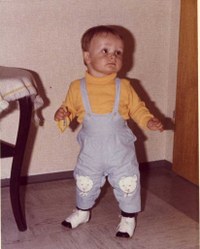Your lecturer's personal profile

Contrary to popular belief, teachers actually do have a life outside the classroom. They have strengths and weaknesses, likes and dislikes, skeletons in their closets and much more.
The following titbits of information are intended to give you a more complete picture of your instructor as a person. Please remember, though, that all information provided here is completely incomplete, thoroughly superficial and objectively biased. After all, there is no arguing with a person’s opinions and tastes, is there?! So enjoy!
What's in a name?
Like so many Germans who have spent some time living in the United States, I also I had the distinct feeling that I lacked something rather crucial: a middle name.

While many of my compatriots simply invent a middle initial, I took the opportunity to get a real middle name in 1999, when I converted to the Greek Orthodox faith. As it turned out, I was quite lucky because the priest - who originally suggested "Theoktistis" (meaning built on God) - ended up using "Joseph" instead. Well, not that "Joseph" is inherently more attractive-sounding than "Theoktistis", but at least it's a name I can relate to: Both my late maternal grandfather and my late father-in-law were called Joseph.
Perky post-punk
What makes an English teacher want to study English in the first place? A variety of factors, obviously. But if I'm honest, one important reason why I studied English was that I finally wanted to understand all my favourite song lyrics, most of which were in English.

I know this sounds rather silly, but let me explain: As a child of the 1980s, post-punk music was my internet and my smartphone - only better. When "i-this" and "you-that" weren't around, it was how you met people, how you grew to like (or dislike) them, how you identified with some of them (and fought with others), how you made political statements, got emotional support and much else besides. Well, you get the idea: It was quite important for me then... And it has been ever since.
With the benefit of hindsight, I really believe that this ongoing love affair with something as lowbrow as song lyrics has rubbed off on my relationship with English: The language has always been much more to me than just a means of communication. I have a deep emotional involvement with it, and being able to use it and learn more about it does not feel like 'work' at all. Quite the opposite, in fact...
And the best thing about it is that studying English and listening to my favourite radio stations is now one and the same thing. So, if you're interested, take an earful of the following:

- Byte FM -- quality music with background info galore
- Royal FM -- indie disco, electro and guitar pop from Berlin
Si vis pacem, para bellum
More recently, some of my spare time has been taken up by martial arts training. I originally developed this interest some time ago, when I noticed that the most easy-going and even-tempered students of mine were those who had trained in some style of martial art. This, I felt, was something to aspire to. So I consider myself really lucky to train with an instructor I can admire not only for his superior technique and significant experience, but also for his personality and character.

What I've learned from him is that a martial art is about much more than just giving us an immediate experience of physical violence (which most of us sorely lack) or teaching us more or less effective techniques of defending ourselves against violence. Rather, it is an exercise in building character. It forces us to confront difficult issues that most of us would rather forget about: knowing the effects of violence on ourselves and others, learning to control our violent impulses, and understanding that total commitment is needed to end violence quickly.
Only by dealing with these issues will we ultimately develop a more mature and responsible approach to violence -- and maybe find some wisdom, inner peace and harmony.
Radical reading

My favourite pastime, however, is to pour a coffee and sit down with a good book.
In my definition, a 'good' book is one that is typically written in English and gives me some insight into how - in contemporary history - people's radical ideas have morphed into institutions or movements that carry within them the seeds of their own destruction. I thus enjoy reading about the history of the Second World War, the major Cold-War intelligence agencies, the Bauhaus and Dada movements, and the German Red Army Faction.
Lately I've also taken a strong interest in the history of philosophical thought and the self-destructive tendencies built into post-modern capitalism itself. Several books in this field have left a deep and lasting impression on me - among them Gary Shteyngart's Super Sad True Love Story, Dave Eggers's The Circle, Douglas Coupland's Worst. Person. Ever., and 'Ten Arguments For Deleting Your Social Media Accounts Right Now' by Jaron Lanier.
